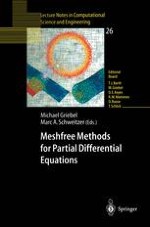2003 | OriginalPaper | Buchkapitel
LPRH — Local Polynomial Regression Hydrodynamics
verfasst von : John F. Wallin, Aamer Haque
Erschienen in: Meshfree Methods for Partial Differential Equations
Verlag: Springer Berlin Heidelberg
Enthalten in: Professional Book Archive
Aktivieren Sie unsere intelligente Suche, um passende Fachinhalte oder Patente zu finden.
Wählen Sie Textabschnitte aus um mit Künstlicher Intelligenz passenden Patente zu finden. powered by
Markieren Sie Textabschnitte, um KI-gestützt weitere passende Inhalte zu finden. powered by
Local Polynomial Regression (LPR) is a weighted local least-squares method for fitting a curve to data. LPR provides a local Taylor series fit of the data at any spatial location. LPR provides estimates not only to the data, but also to derivatives of the data. This method is contrasted to the method of Moving Least Squares (MLS) which only provides a functional fit for the data. To obtain derivatives using MLS, one would be required to take analytic derivatives of the MLS functional fit. Since differentiation is known to be an unsmoothing operation, the derivatives obtained in MLS are thus less smooth than LPR derivatives. This fact has great implications for the stability of numerical methods based on MLS and LPR.MLS and LPR can be directly used in a differential equation to provide a numerical scheme that mimics finite-differences. LPR was found to be much more stable than MLS in such a setting. However, these numerical methods cannot accurately solve nonlinear PDE’s in this fashion.Particle or mesh-free methods for hydrodynamics typically use artificial viscosity to stabilize themselves when shocks are present. LPR can be used to solve the equations of hydrodynamics (Euler equations) without artificial viscosity. The Van Leer flux splitting scheme is used in conjunction with LPR to provide a stable and robust solution to the Euler equations. Numerical solutions are computed on both fixed and moving particle distributions.
